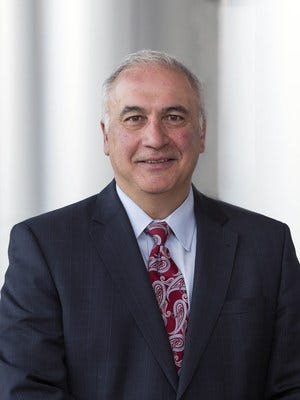DTE Energy Co. expects electric vehicles could represent a 3% to 4% increase in demand in the 2030s, CEO Jerry Norcia told The Detroit News on Wednesday.
Key to the Detroit-based utility’s plan to achieve carbon neutrality by 2050 is decreasing electricity demand by 2% each year. EVs, however, are expected to offset much of those decreases, Norcia said. That means Michigan could need more electric generation in the coming decades even as DTE and other utilities are retiring their coal-fired power plants.

We’re offering a great deal on all-access subscriptions. Check it out here.
“I think the EVs, the electric vehicles, will be a game-changer in terms of demand for the electric industry, and there’s also a push to electrify other uses of energy today in industrial processes,” Norcia said during a meeting with The News’ editorial board. “The demand will be in flux, and that could create incremental needs for generation and certainly incremental needs on the grid and wire system to accommodate all this new load. We’ve been getting ready so that we will be ready.”
This comes as DTE saw an 8% to 10% increase in demand from residential customers over the past year when many workers were sent home to work remotely amid the COVID-19 pandemic, Norcia said. With many companies, including DTE, adopting a hybrid model allowing employees to continue to work remotely for some days of the week, that demand is likely to remain heightened.
DTE has had to beef up certain areas where capacity already was strained and exacerbated by the pandemic. The company also will have to make updates to much of the grid to accommodate EV charging at home, Norcia said.
“Our understanding from all of the research we’ve done with the automakers is that people prefer to recharge at home,” he said. “We will have to prepare for that in terms of getting power to people’s homes in a reliable way.”
Updates in preparation for EVs have been underway for the past five years, Norcia said. The company is investing $1 billion annually to upgrade substations and neighborhood transformers to be able to host more demand created by EVs. The new equipment is meant to anticipate changes in load for the next 20 to 30 years.
DTE currently has 10,000 megawatt-hours of capacity that offer a 15% to 20% reserve margin, a typical industry standard in cases when plant mechanics may experience problems, Norcia said. Of that capacity, a quarter currently comes from renewables like solar and wind, and 10% comes from carbon-free nuclear power.
By the end of 2022, DTE will have retired three coal-powered plants in River Rouge, St. Clair and Trenton. Belle River in China Township is slated for closure in 2030. Monroe, DTE’s largest and last coal plant, is expected to close in 2040.
“I don’t think it will be later,” Norcia said of the coal plant retirements. He added planning for the coming years is happening now with respect to EVs. “We have to see how this market evolves, but the new sources of generation that are available to us will most likely replace the existing generation fleet, which will be renewables and natural gas and other sources of gas.”
Retiring the coal plants by 2040 will decrease carbon emissions by 80% from 2005 levels, according to DTE. Replacing them is generation from renewables and natural gas plants. Those plants are about 50% more efficient than the aging coal plants, Norcia said, and natural gas emits 20% to 30% less carbon than coal.
DTE is building a new natural gas plant in East China Township to come online next year. Five years ago it acquired two more natural gas plants to make up roughly megawatt for megawatt the coal production it is retiring. In addition to traditional natural gas, these plants can burn renewable natural gas coming from landfills and animal waste, Norcia said.
By 2030, renewables should represent up to 30% of DTE’s energy mix. The company still will need gas to heat homes and supply reliable energy when the sun doesn’t shine and wind doesn’t blow. To overcome the final 20% of carbon emission reductions needed by 2050, much of it will depend on advancements in technology.
The company expects to use carbon capture and sequestration to assist. That includes growing trees but also capturing emissions and storing them underground. Advancements in energy generation from hydrogen and small nuclear reactors could become options if they become more economically feasible.
It costs $3 per kilowatt-hour to make electricity from natural gas versus $14 from nuclear, Norcia said. DTE expects Macomb County’s nuclear Fermi 2 power plant to continue running into the 2060s and has a license for Fermi 3.
“Until those capital costs come way down,” Norcia said, “it’s going to be hard for us to think about nuclear.”
DTE also sees its role in preparing the infrastructure to allow for the installation of EV charging stations.
“If they bring the cars,” Norcia said, “we will bring the juice.”
bnoble@detroitnews.com
Twitter: @BreanaCNoble